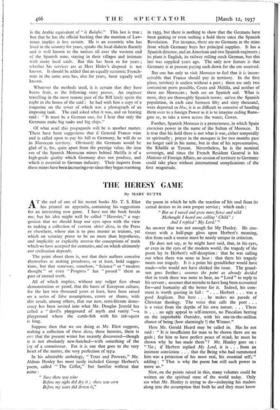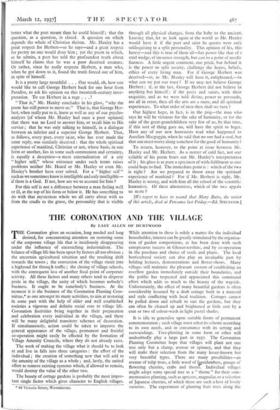THE HERESY GAME
By MARY BUTTS
AT the end of one of his recent books Mr. T. S. Eliot has printed an appendix, containing his suggestions for an interesting new game. I have not the book beside me, but his idea might well be called " Heresies," a sug- gestion that we should keep our eyes open with the view to making a collection of current obiter dicta, in the Press or elsewhere, whose aim is to pass muster as truisms, yet which on scrutiny prove to be no more than hypotheses, and implicitly or explicitly reverse the conceptions of truth which we have accepted for centuries, and on.which ultimately our civilisation depends.
The point about them is, not that their authors conceive themselves as making paradoxes, or at least, bold sugges- tions, but that someway, somehow, " Science " or " modern thought " or even " Progress " has " passed " them as part of eternal truth.
All of which implies, without any vulgar fuss about demonstration or proof, that the bases of European culture, for the last two thousand years at least, have been raised on a series of false assumptions, errors or shams, with this result, among others, that our new, semi-literate demo- cracy has been invited into what Mr. Douglas Jerrold has called a " devil's playground of myth and vanity "—a playground where the cattle-fish with his ink-squirt is king.
Suppose then that we are doing as Mr. Eliot suggests, making a collection of these dicta, these heresies, there is that the present writer has recently discovered—though it is not absolutely new-hatched—with something of the joy of a connoisseur. For it is one that goes to the very heart of the matter, the very perfection of type.
In his admirable anthology, " Texts and Pretexts," Mr. Aldous Huxley has most justly included George Herbert's poem, called " The Collar," but familiar without that name • " Sure there was wine Before my sighs did dry it; there was corn Before my tears did drown it," the poem in which he tells the reaction of his soul from its carnal desires to its own proper service; which ends : " But as I raved and grew more fierce and wild Methought I heard one calling Child' : And I replied My Lord.' " An answer that was not enough for My Huxley. He con- tinues with a half-page gloss upon Herbert's meaning, that from such a source must be nearly unique in criticism. He does not say, as he might have said, that, in his eyes, or even in the eyes of the modern world, the tragedy of the poem lay in Herbert's self-deception : that he was calling out when there was none to hear : that there his tragedy meets our tragedy. It is a point his grandfather would have made—who would not have shirked the issue. The grand- son goes further ; assumes the point as already decided that in truth there was none to hear, no "Lord" to reply to his servant ; assumes that mistake to have long been accounted for—and humanity all the better for it. Indeed, his com- ment is worth quoting in full : " . . . Herbert . . . was a good Anglican. But here . . . he makes no parade of Christian theology. The voice that calls the poet . . . is a voice from the depths of his own nature. . . . There is . . . no ugly appeal to self-interest, no Pascalian betting on the improbable Outsider, with his one-in-the-million chance of being (how alarmingly D' the Winner."
Here Mr. Gerald Heard may be called in. Has he not said : " It is insufficient for man to be shown there are no gods ; for him to have perfect peace of mind, he must be shown why he has made them "? Mr. Huxley goes on : " No ; if Herbert replied My Lord, it is . . . from an intimate conviction . . . that the Being who had summoned him was a projection of his most real, his essential self; " adding : " That is why the poem has still such power to move us."
Now, on the points raised in this, many volumes could be written on the spiritual state of the world today. Only see what Mr. Huxley is trying to do—jockeying his readers along into the assumption that both he and they must know better what the poet meant than he could himself ; that the question, as a question, is closed. A question on which depends the whole of Christian theism. Mr. Huxley has a great respect for Herbert—so he says—and a great respect for poetry no one would deny him ; yet the poem in which, as he admits, a poet has told the profoundest truth about himself he claims that he was a poor deceived creature. Or rather, since he really respects Herbert, a man who, when he got down to it, found the truth forced out of him, in spite of himself.
It is a pretty large mouthful . . . One would, oh, how one would like to call George Herbert back for one hour from Paradise, to ask his opinion on this twentieth-century inter- pretation. To see Herbert in a rage . . . !
"That is," Mr. Huxley concludes in his gloss, "why the poem has still power to move us." That is, that George Her- bert, when really put to it, knew as well as any of our psycho- analysts (of whom Mr. Huxley had once a poor opinion) that there was no Lord to answer him, or recall him to His service ; that he was only talking to himself, in a dialogue between an inferior and a superior George Herbert. That, as follows, every poet, every saint, who has ever made the same reply, was similarly deceived : that the whole spiritual experience of mankind, Christian or not, whose basis, in one form or another, lies in some such communion and certainty, is equally a deception—a mere externalisation of a coy " higher self," whose existence under such terms raises problems neither Mr. Heard or Mr. Huxley or even Mr. Huxley's brother have ever solved. For a " higher self " such as we sometimes know is intelligible and only intelligible— if there is a God. If not, how are we to account for him ?
For this self is not a difference between a man feeling well or ill, at the top of his form or below it. He has something to do with that mysterious whole we all carry about with us from the cradle to the grave, the personality that is visible through all physical changes, from the baby to the ancient. Leaving that, let us look again at the world as Mr. Huxley would have it if the poet and saint he quotes were only soliloquising to a split personality. This opinion of his, this heresy—and this is true of them all—has power like that of a steel wedge, of immense strength, but cast to a point of needle fineness. A little urgent comment, one prick, but behind it is the power to split society, challenge the hopes, beliefs, ethics of every living man. For if George Herbert was deceived—or, as Mr. Huxley will have it, enlightened,—in what can we put our trust ? If we may not believe George Herbert ; if, at the last, George Herbert did not believe in anything but himself; if the poets and saints, with their exquisite, and as we were told divine, power to persuade, are all in error, then all the arts are a snare, and all spiritual experiences. To what order of men then shall we turn ?
Our highest hope, in fact, is in the prig—the man who says he will be virtuous for the sake of humanity, or for the sake of the great-grandchildren very few of us, by that time, if this sort of thing goes on, will have the spirit to beget. Have any of our new humanists read what happened to Aurelian Macgoggin, when he said that no one had a soul, but that one must worry along somehow for the good of humanity ?
To return, however, to the point at issue between Mr. Huxley and Mr. Herbert. As a matter of cold fact, not one syllable of his poem bears out Mr. Huxley's interpretation of it ; his gloss is as pure a specimen of wish-fulfilment as one could hope to find. The immediate point is : which of the two is right ? Are we prepared to throw away the spiritual experience of mankind ? For if Mr. Herbert is right, Mr. Huxley is wrong, and with him all the school of the scientific humanists.' Of these alternatives, which of the two appals us mare ?
[We regret to have to record that Mary Butts, the writer of this article, died at Penzance last Friday.—Ed. SPECTATOR.]















































 Previous page
Previous page